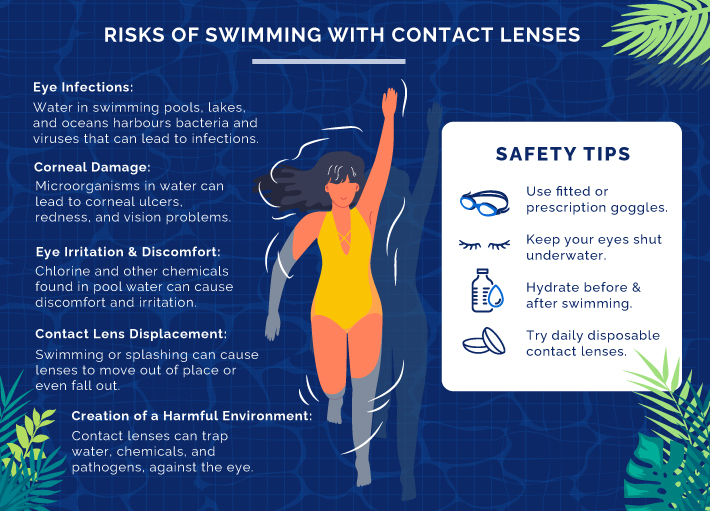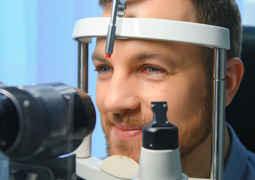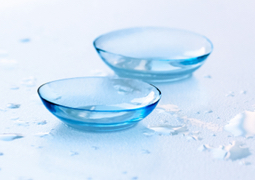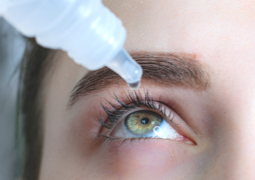Swimming is a favourite activity for many, offering a refreshing way to stay fit and cool off on hot days. For contact lens wearers, the allure of hitting the pool or taking a dip in the ocean can present a conundrum. Can you swim with contact lenses, or is it a risky endeavour that could jeopardize your eye health?
Exposing contact lenses to water can introduce various risks to your eye health, so it’s best to avoid swimming with contact lenses whenever possible. However, if you must wear your lenses while swimming, there are some workarounds that may help protect your eye health.
If a refractive error makes it difficult for you to swim without your contact lenses, talk to your eye doctor about your options. They may recommend prescription swim goggles or solutions such as refractive surgery to help improve your vision when swimming.
The Basics of Contact Lenses
Contact lenses come in a variety of types, each designed with specific purposes—from correcting vision to changing eye colours.
Soft contact lenses are most common for their comfort and breathability, while hard or gas-permeable lenses offer sharper focusing for some individuals. All types require proper care routines to ensure you have a healthy contact lens-wearing experience.
Proper lens care includes cleaning before and after each use, using recommended contact solution, and following the lens-wearing schedule recommended by your eye care professional.
The Risks of Swimming with Contact Lenses
Water—be it from the ocean, lakes, rivers, or the local pool—contains microorganisms that can adhere to your lenses, potentially leading to eye infections. Chlorinated water in pools, in particular, can cause contact lenses to tighten on the eye’s surface, leading to discomfort and possible irritation.
Keep these risks in mind:
- Eye Infections: Water in swimming pools, lakes, and oceans can harbour bacteria, viruses, and amoebae that can attach to your contact lenses and lead to infections like keratitis.
- Corneal Damage: The presence of microorganisms can lead to corneal ulcers, causing pain, redness, blurred vision, and in severe cases, vision loss.
- Eye Irritation & Discomfort: Chlorine and other chemicals found in pool water can react with contact lenses, causing discomfort and irritation.
- Contact Lens Displacement: Rapid movements in water, such as swimming or splashing, can cause lenses to move out of place or even fall out, potentially leading to vision problems underwater.
- Creation of a Harmful Environment: Contact lenses can trap water, along with any chemicals or pathogens it contains, against the eye, creating an environment conducive to infections.
Precautions You Can Take
If you do come into contact with water while wearing your contacts, taking certain precautions may help reduce the risks associated with water exposure:
- Keep Your Eyes Shut: If you find yourself without goggles, keeping your eyes shut tight while submerged may prevent water contact with your lenses, especially in the case of accidents like splashes or jumps.
- Limit Exposure: If you often spend time near or in the water, limit the time you wear contact lenses. Wear them only for activities where you’ll be above water for the majority of the time.
- Daily Contact Lenses: When it comes to swimming, daily lenses are preferred over monthly contact lenses since you’re able to throw out your lens right after you exit the pool.

Tips for Swimming When You Wear Contact Lenses
For those unsure about how to safely go swimming when you normally wear contacts, here are some actionable tips to help you safeguard your eye health:
- Carry a lens case and contact solution: Having a lens case filled with your preferred solution on hand can make it easy to quickly remove and store your lenses before you go swimming.
- Follow a proper after-swimming routine: Following a step-by-step aftercare routine that involves cleaning and soaking your lenses in fresh solution can help prevent complications from wearing contacts after swimming. You should talk to your eye doctor about how to wait to put contact lenses in after swimming.
Can You Swim with Contact Lenses & Goggles?
You can swim with contact lenses and goggles, but only with a pair of well-fitted goggles that won’t let in water. Investing in a pair of well-fitting goggles not only protects your lenses from coming into contact with water but can also shield your eyes from chlorinated or salty water, preventing eye irritation.
If you’re unsure about your goggles, feel free to ask your eye doctor. We can provide advice to help you swim safely with the right support for your vision and eye health.
Alternatives to Contact Lenses
If swimming is a big part of your life, you may want to consider the other options available for seeing clearly without the potential conflict caused by standard contact lenses.
For example, you may want to speak with your doctor about daily disposable lenses, which can be used once and discarded, making it easier to dispose of them before swimming. Or, you may want to consider asking about goggles with prescription lenses.
Lastly, laser eye surgery may be worth considering if you often face challenges caused by the need to wear glasses or contacts.

Will You Take the Plunge?
The allure of swimming might be strong, but the potential consequences of doing so while wearing contacts can be severe. Protecting your eyes is crucial, and that means thinking twice before taking a plunge with your lenses on.
Ultimately, the best rule of thumb is to prioritize your eye health, and when in doubt, consult your optometrist. We can provide personalized guidance to help ensure that you can see clearly without compromising your eye safety.
Contact us at Calgary Family Eye Doctors today.




























